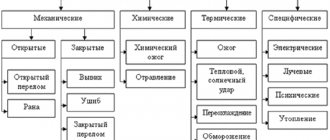The procedure for bringing to disciplinary liability an employee of the Labor Code of the Russian Federation
The procedure is carried out in 4 stages:
- Detection and recording of misconduct.
- Receiving written explanations from the employee or documenting the refusal.
- Assessment of the objective circumstances of the offense, taking into account the gravity of the act.
- Drawing up and issuing an order.
The employer is obliged to obtain an explanation from the employee in writing before applying the type of penalty in question (see Article 193 of the Labor Code of the Russian Federation). If the latter refuses to provide an explanatory note, then the employer must record such a decision in an act.
Let us consider in detail each stage of the procedure for bringing an employee to disciplinary liability.
Recording an offense
The employer has the right to record the employee’s misconduct in one of the following ways:
- an absence from work report or other document documenting violations of labor discipline;
- an official or memorandum;
- report card in form T-13.
Video recordings, witness statements and data from the checkpoint are suitable as evidence of a violation in the event of a trial. It must be remembered that the presence of documentary evidence of misconduct is a decisive basis for bringing the employee to justice through the court. Recording in paper form is all the more important for complying with the established deadlines for bringing to disciplinary liability.
Do you need legal advice on labor disputes? Contact . To contact a lawyer, call 8 (499) 444-00-00 or leave a request on the website rosco.su.
Obtaining explanations from an employee
The form of explanation is not established by law, but it is recommended to obtain clarification in writing. To do this, the employer must send a demand to the employee in the form of a request for explanations. It is better to draw up the document in two copies: one for the employee, the second (with a receipt mark) for the employer.
If the employee is absent from the workplace, then you need to send a registered letter of demand to the address of actual residence, as well as to the place of registration of the defendant in an individual labor dispute.
In the absence of written explanations from the employee, the employer will have to prove the fact of requesting an explanation from the offender. Otherwise, the court will declare the disciplinary sanction illegal. The situation is complicated by the fact that giving explanations is a right, not an obligation, of an employee.
If the employee completely refuses to draw up an explanatory note, then an act must be drawn up two days after receiving the refusal.
The act must contain the following information:
- FULL NAME. and the positions of the employee and other officials: those responsible for drawing up the document, the head and director of the organization;
- 3 dates - commission of an offense, sending a demand and drawing up an act;
- words that the employee refused to provide an explanation.
This is the mandatory procedure for bringing an employee to disciplinary liability. If it is not observed, the employer’s actions will be declared illegal by the court.
Assessing the circumstances and taking into account the severity of the offense
When determining an employee’s guilt, it is important to consider factors such as:
- absence of other penalties from the employee;
- availability of bonuses and incentives;
- attitude towards work;
- etc.
This requirement follows from Resolution of the Plenum of the Armed Forces of the Russian Federation No. 2 of March 17, 2004. The assessment of an employee’s guilt is obviously subjective: the boss independently decides on the need to apply a penalty. This statement is confirmed by the content of Part 1 of Art. 22 Labor Code of the Russian Federation. It is important to have evidence:
- misdemeanor;
- taking into account the degree of severity;
- the circumstances of its commission.
If the judge determines that the employer did not take into account the circumstances of the misconduct, then the order to bring the employee to disciplinary liability will be considered void, and the judge will cancel it without the possibility of applying another type of penalty.
Issuance of an order to bring an employee to disciplinary liability
After all the preparatory activities have been completed, you can move on to the final stage. The employer has the right to issue an order after:
- provision of an explanatory note by an employee;
- recording the act of his refusal.
When choosing a sanction such as a reprimand or reprimand, it is necessary to correctly draw up an order to hold the employee accountable. The document is drawn up in writing, in free form. According to Art. 193 of the Labor Code of the Russian Federation, the order must be handed over to the employee for review within three working days. days from the date of its publication (excluding the time the employee was absent from work). If the employee refuses to sign the document, it is necessary to draw up a corresponding act.
Any error in the formalization of the procedure for bringing an employee to disciplinary liability or violation of the established deadlines for recording an offense may become a reason for challenging the case in court.
Lawyers will help you competently bring employees to disciplinary liability. To get professional advice, call us at 8 (499) 444-00-00 or leave an online application on the website rosco.su. A specialist will contact you shortly.
An employee is absent from work without good reason
Let's imagine that you are the head of a small company. Visit the engineer with an important task, but he is not at his workplace. You understand that he did not appear here today and did not warn you that he would be absent.
First of all, find out why it is not there. Perhaps the employee has a good reason for this. You can call, go to his home, or send a registered letter asking him to explain where he is. Find out until you get the truth. It happens that an employee’s absence for a good reason can last for several months: he is seriously ill, a natural disaster has occurred, and there is no way to report it. In this case, he does not violate anything, and you will not be able to fire him.
Work with employees taking into account the industry specifics of your enterprise
If the reason is still not valid, look at the circumstances. Leaving for half an hour or taking a long time to return from lunch is a minor offense. But if an employee skips the entire shift or leaves the workplace for more than 4 hours, this is already a gross violation (clause 1 of Article 81 of the Labor Code of the Russian Federation).
Rostrud draws attention to the concept of “specific workplace of an employee.” If it is not specified in the employment contract or local regulatory act, then in case of disputes it is considered the place where the employee must arrive in connection with his work and which is directly or indirectly under the control of the employer (Article 209 of the Labor Code of the Russian Federation).
In most cases, there is no need to register the specific address of the office where the workplace is located: this will cause confusion if a legal dispute occurs with an employee who works in another building. It is enough to indicate the location of the company in the employment contract (Article of the Labor Code of the Russian Federation).
About the workplace in the employment contract
Dismissal as a disciplinary sanction
Let us note that an employee can be dismissed on the basis of clause 5 of part 1 of Article 81 of the Labor Code of the Russian Federation only if he repeatedly violates his work duties without good reason.
Violation of labor duties is recognized as repeated if, despite a disciplinary sanction that has not been lifted or extinguished, the employee continues or is guilty of culpable non-fulfillment or improper performance of labor duties.
It is in this case that a new disciplinary sanction in the form of dismissal can be applied to the employee.
How to formalize termination of an employment contract
The employer formalizes the termination of the employment contract by order. In the document, he indicates the employee’s misconduct, which became the reason for his dismissal. Within three working days, familiarizes the employee with the order against signature. If the employee is against it, the manager draws up a free-form act of refusal to familiarize himself with the order. Be prepared for the fact that the employee may appeal your decision to dismiss in court.
Certificate of refusal
Expert - Irina Savelyeva, HR project manager at Kontur. The material was prepared by Elena Yarkina, editor.
Possible disciplinary action
Possible types of disciplinary sanctions are given in Art. 192 Labor Code of the Russian Federation. Their list is limited and does not allow for free interpretation. These types include:
- comment;
- rebuke;
- dismissal.
Although the legislation may provide for other types of punishment for certain categories of workers, such as civil servants, employees of internal affairs bodies, customs, the prosecutor's office, etc. (Article 192 of the Labor Code of the Russian Federation).
NOTE! A monetary fine cannot be used as a disciplinary sanction. For this, the employer himself may receive a fine from the labor inspectorate. And if the fined person goes to court, the employer will be obliged to reimburse him for what was withheld and to pay interest for the delay under Art. 236 of the Labor Code of the Russian Federation, and possibly compensation for moral damage. Whether it is possible to deprive employees of bonuses for misconduct, find out here.
The choice of the type of disciplinary liability is made taking into account a number of factors:
- the specific circumstances in which the violation was committed;
- characteristics of the employee’s personality and whether he has other offenses or, conversely, merits;
- assessing the severity of the consequences of the violation and the proportionality of the punishment.
Only one penalty can be imposed for one violation (Article 193 of the Labor Code of the Russian Federation). But punishment can be applied to one employee more than once, while changing the types of penalties, in cases where:
- as a result of the penalty the violation is not terminated;
- the offenses are repeated periodically;
- New types of offenses are being committed.
Two types of liability (disciplinary and material) can be applied simultaneously if, as a result of a disciplinary offense committed by an employee, material damage is caused to the employer (Article 248 of the Labor Code of the Russian Federation).
Before placing an order
Before issuing an order to impose a penalty, it is necessary for the offending employee to give written explanations, which should be considered by his immediate supervisor. The results of the review are included in a report, which the head of the unit passes on to higher authorities. If an employee refuses to give an explanation, this must be included in a special act.
In cases where a disciplinary violation led to injuries, accidents, etc. consequences, the organization should create a special commission to investigate the incident, since in some situations this offense may be recognized as a crime and serve as the basis for initiating a criminal case. The results of the inspection must also be reflected in the relevant act.
Thus, before writing an order for disciplinary action, it is necessary to prepare three main documents that will serve as the basis for issuing the order: an explanatory statement from the employee, a memorandum from his immediate superior and an act on the identification of the violation.
Does not perform job duties due to changes in local regulations
Let's say the manager has prescribed in a local regulation a new duty for an employee - to prepare a monthly report for the director. The employee did not do this by the required deadline and greatly let down his immediate supervisor. Can an employee be fired for this?
The employee is obliged to comply with the internal labor regulations in force in the organization (Article of the Labor Code of the Russian Federation). But the manager, in turn, must competently make changes to the local regulatory act - taking into account the opinion of the representative body of workers and according to the procedure prescribed in the Labor Code (Part Art. 190, Art. 372 of the Labor Code of the Russian Federation). If changes are made in a different manner, it will not be possible to impose penalties on the employee.
Issue local regulations through Kontur.Personal
The essence of the dispute
By order of the employer, the employee was dismissed under paragraph 5 of part 1 of Article 81 of the Labor Code due to the employee’s repeated failure to fulfill his job duties without good reason, if he has a disciplinary sanction.
The employee appealed to the court to declare the order of dismissal illegal and reinstated in his previous position.
The first and appellate instances came to the conclusion that the organization terminated the employment contract legally. Here's the rationale.
At the time of the repeated failure to fulfill labor duties without good reason, the previous penalty had not been lifted or repaid, therefore the appellate court came to the conclusion that the employer had legal grounds for a disciplinary sanction in the form of dismissal.
The judges also considered that the procedure for applying disciplinary sanctions established by Articles 192 and 193 of the Labor Code of the Russian Federation was observed by the employer in this case. Namely:
- before applying a disciplinary sanction, written explanations are required from the employee regarding the fact of the alleged violation of labor discipline;
- the employee was familiarized with the order to apply a disciplinary sanction in the form of dismissal against signature on the day it was issued;
- When the employer makes a decision to impose a disciplinary sanction in the form of a reprimand, the severity of the disciplinary offense charged to him and the circumstances under which it was committed are taken into account.
However, the Supreme Court did not agree with this position. He pointed out that the issued dismissal order does not make it possible to understand what exactly the disciplinary offense was. But the judges themselves cannot determine this moment.






